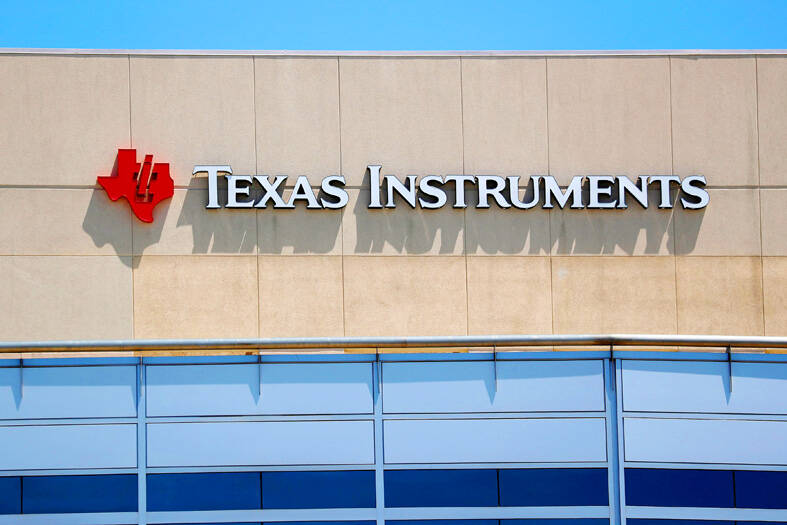Texas Instruments Inc is set to receive US$1.6 billion in CHIPS Act grants and US$3 billion in loans, the administration of US President Joe Biden said on Thursday, the latest major award from a program designed to boost US semiconductor manufacturing.
The funding would help pay for one factory in Utah and two in Texas — projects that would cost about US$18 billion through 2029 — the US Department of Commerce said in a statement. The effort is expected to generate about 2,000 manufacturing jobs and thousands more in construction.
In total, Texas Instruments plans to spend about US$40 billion across both states, including an additional two factories in Sherman, Texas. It is likely that those would come online after 2030, and the Department of Commerce has said it would prioritize projects that would be done by the end of the decade.

Photo: REUTERS
Texas Instruments makes a wide variety of chips and has the biggest customer base in the semiconductor industry. In addition to getting grants and loans, it expects to benefit from 25 percent tax credits from the 2022 CHIPS and Science Act. That could amount to US$6 billion to US$8 billion, the company said in a statement.
The CHIPS Act is the US’ most ambitious foray into industrial policy in more than a generation. It set aside US$39 billion in direct grants — plus tax credits, loans and loan guarantees worth US$75 billion — to persuade companies to make more semiconductors on US soil after decades of production shifting to Asia. Officials have now allocated the lion’s share of the funding via more than a dozen preliminary awards. They expect to wrap up announcements by the end of this year.
Most of the money is slated to support production of cutting-edge chips by companies such as Intel Corp and Taiwan Semiconductor Manufacturing Co (台積電). However, the law set aside a minimum of US$2 billion for less advanced semiconductors — sometimes called legacy chips — such as those produced by Texas Instruments. With yesterday’s announcement, the agency has cleared that threshold. The other major legacy chip award is a US$1.5 billion grant to GlobalFoundries Inc.
Legacy chips are essential to the global economy, powering everything from smartphones to refrigerators to weapons systems. It is also an area where China is increasing its ambitions. The US and the EU have become alarmed by Beijing pouring billions into factories making these processors, and Biden announced in May that he would double tariffs on the Chinese components to 50 percent.
The award for Texas Instruments would help ensure “a secure domestic supply of the foundational semiconductors that are the building blocks for nearly every aspect of modern life,” Undersecretary of Commerce for Standards and Technology Laurie Locascio said.

When an apartment comes up for rent in Germany’s big cities, hundreds of prospective tenants often queue down the street to view it, but the acute shortage of affordable housing is getting scant attention ahead of today’s snap general election. “Housing is one of the main problems for people, but nobody talks about it, nobody takes it seriously,” said Andreas Ibel, president of Build Europe, an association representing housing developers. Migration and the sluggish economy top the list of voters’ concerns, but analysts say housing policy fails to break through as returns on investment take time to register, making the

NOT TO WORRY: Some people are concerned funds might continue moving out of the country, but the central bank said financial account outflows are not unusual in Taiwan Taiwan’s outbound investments hit a new high last year due to investments made by contract chipmaker Taiwan Semiconductor Manufacturing Co (TSMC, 台積電) and other major manufacturers to boost global expansion, the central bank said on Thursday. The net increase in outbound investments last year reached a record US$21.05 billion, while the net increase in outbound investments by Taiwanese residents reached a record US$31.98 billion, central bank data showed. Chen Fei-wen (陳斐紋), deputy director of the central bank’s Department of Economic Research, said the increase was largely due to TSMC’s efforts to expand production in the US and Japan. Investments by Vanguard International

WARNING SHOT: The US president has threatened to impose 25 percent tariffs on all imported vehicles, and similar or higher duties on pharmaceuticals and semiconductors US President Donald Trump on Wednesday suggested that a trade deal with China was “possible” — a key target in the US leader’s tariffs policy. The US in 2020 had already agreed to “a great trade deal with China” and a new deal was “possible,” Trump said. Trump said he expected Chinese President Xi Jinping (習近平) to visit the US, without giving a timeline for his trip. Trump also said that he was talking to China about TikTok, as the US seeks to broker a sale of the popular app owned by Chinese firm ByteDance Ltd (字節跳動). Trump last week said that he had

STRUGGLING TO SURVIVE: The group is proposing a consortium of investors, with Tesla as the largest backer, and possibly a minority investment by Hon Hai Precision Nissan Motor Co shares jumped after the Financial Times reported that a high-level Japanese group has drawn up plans to seek investment from Elon Musk’s Tesla Inc to aid the struggling automaker. The group believes the electric vehicle (EV) maker is interested in acquiring Nissan’s plants in the US, the newspaper reported, citing people it did not identify. The proposal envisions a consortium of investors, with Tesla as the largest backer, but also includes the possibility of a minority investment by Hon Hai Precision Industry Co (鴻海精密) to prevent a full takeover by the Apple supplier, the report said. The group is